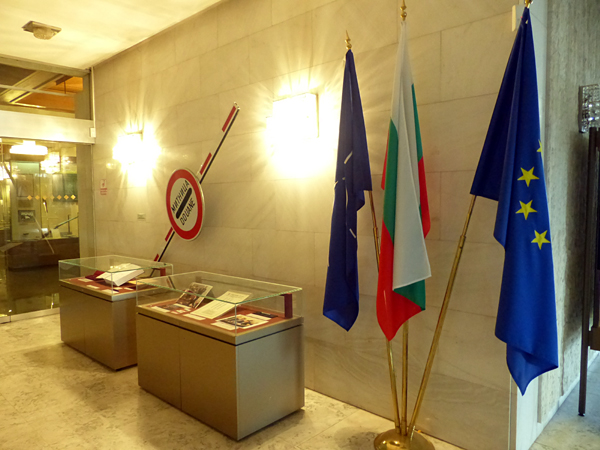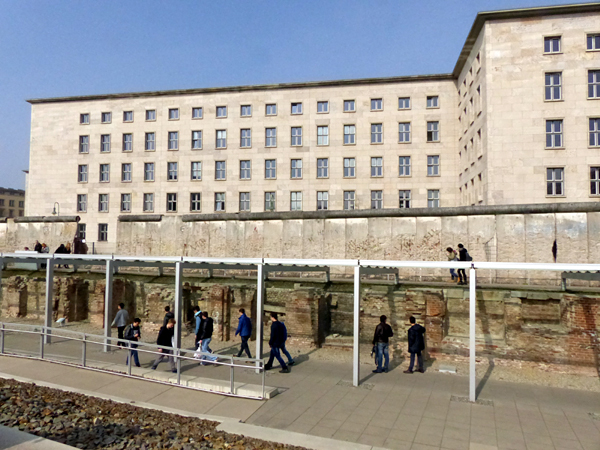
<< · I · II · III · IV · V · VI · VII · VIII · IX · X · XI · XII · XIII · XIV · XV · XVI · XVII · XVIII · XIX · XX · XXI
13th Transatlantic Students Symposium
Crisis of Mission:
Transatlantic (Mis)Understandings of European Integration
Humboldt-Universität zu Berlin, Oregon State University,
University of Warsaw
Bulgaria and Berlin, March 20-29, 2015




Program Description
The idea of crisis has been very prevalent in both Europe and North America in recent years. A conjunction of economic, social, political, cultural and diplomatic challenges has seemingly left both continents with a sense of having to reconcile their respective identities, and consequently also their connection with each other.
Specifically, both the United States of America and the European Union have ostensibly been founded with a sense of mission. Part of the American mission saw its realization in supporting their European partners during two world wars, and subsequently during the Cold War. Marshall Plan aid and coordination was instrumental in supporting a process of European integration that was begun already in the aftermath of World War I and that sought to bring an end to an almost constant state of war on the European continent by the means of economic integration and under the protective umbrella of NATO.
The end of the Cold War seemed to affirm the victory of these joint efforts, and to demonstrate the superiority of the new transatlantic alliance. Yet history - and specifically, the debate over the most successful system of governance and economy - was not at an end. The violent breakup of Yugoslavia, the wars in Chechnya, Terror attacks in New York, Madrid and London, wars in Afghanistan and Iraq, the Russo-Georgian War, the Arab Spring and the current conflict in Ukraine have all put to a test not just the European Union and the United States, but also the transatlantic relationship itself.
Despite a growing awareness of the need for greater EU-US economic cooperation in the face of global challenges, there is a growing sense of divergent interests and a level of distrust between the transatlantic partners. In the eyes of many Europeans, the United States is at fault for placing its security interests ahead of civil liberties and human rights by conducting extensive government surveillance at home and abroad, and by continuing to conduct military interventions. Conversely, in the eyes of many Americans, Europe is toothless in its reluctance to provide for its own security, and to intervene militarily wherever it is seen as necessary. Most recently, this concerns the recent hesitation in responding to the annexation of Crimea and further threats to Ukrainian sovereignty by Russia.
This crisis has been exacerbated by an ongoing economic crisis since 2008, which has led to serious questioning not just of the economic system, but also of national sovereignty, free trade vs. protectionism, social welfare, political participation, civil society, even of democracy itself. These questions also touch on social and cultural issues, such as definitions of marriage, immigration, protection of minorities, solidarity, separatist movements in Europe, and challenges to deeply entrenched notions of cultural identity.
Ample ground exists for possible mutual misunderstandings of the specific issues and interests involved, both within Europe and in the United States, about the ongoing process of European integration. Given the wide range of stakes for the various parties involved, the task of defining a mission for the European Union and for the relationship between the United States and Europe is both a daunting challenge and a pressing necessity.
The 13th Transatlantic Students Symposium will explore and evaluate the many complexities characterizing current American and European policy making and the transatlantic relationship pertaining to European integration. This will include issues such as immigration, minority rights, national and regional identity as well as their cultural representations.
An interdisciplinary group of students and faculty from Europe and the US will visit sites of historical, political and cultural importance in Bulgaria, Greece, Macedonia and Germany in order to address the aims of the mission of European integration that is anchored in a strong transatlantic partnership and the ways it can respond to the challenges posed by the current crisis in various intersecting spheres of domestic and foreign policy, culture, society and education.
Symposium Week Field Trips
Workshops: American University in Blagoevgrad (workshop on Energy Policy), American Research Institute in Sofia (workshop with journalist Dimitar Kenarov on current political challenges in Europe, especially Crimea)
Site Visits: Plovdiv: Greco-Roman Antiquities, Old Town; Rila Monastery; Sofia: National Historical Museum, Alexander Nevsky Cathedral; Berlin: Topography of Terror
Institutional Visits: German Bundestag (meeting with CSU Representative Kathrin Albsteiger); Representation of the State of Baden-Württemberg in Berlin; German Bundesrat; Representation of the European Commission in Berlin
Total participants: 31
Organizers
Dr. Philipp Kneis, Dr. Allison Davis-White Eyes,
Dr. Brent Steel (OSU),
PD Dr. Reinhard Isensee (Humboldt),
Dr. Tomasz Basiuk (Warsaw)
Student Organizers
Eva Rüskamp, Leon Fritz, Charlotte Eisenblätter (Humboldt), Julia McKenna (OSU), Aleksandra Leniarska (Warsaw)
Student Participants (not organizers)
19 (Humboldt: 6, OSU: 8, Warsaw: 3, AUBG: 2)
Conference Program
Complete Report on the 13th Symposium
Syllabus for Preparatory Class at OSU
Partners and Supporters
Humboldt-Universität zu Berlin: International Office,
Humboldt-Universität, Philosophical Faculty II,
American Studies Program,
Humboldt-Universität, Students Union English and American Studies
Oregon State University:
Public Policy Graduate Program,
Diversity & Cultural Engagement
University of Warsaw, American Studies Center
Holiday Land Richter Reisen, Berlin
see also: Latest Program Report
back to: Symposia

Sofia

Rila Monastery

National History Museum of Bulgaria

Topography of Terror, Berlin

Memorial to the Genocide of the Sinti and Roma, Berlin

Meeting at Bundestag